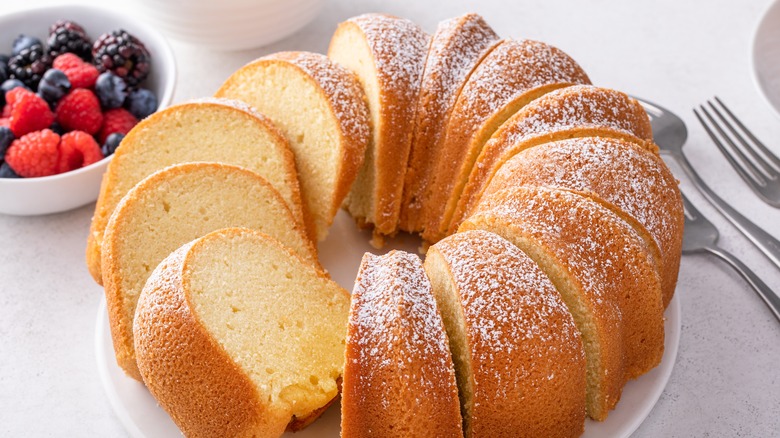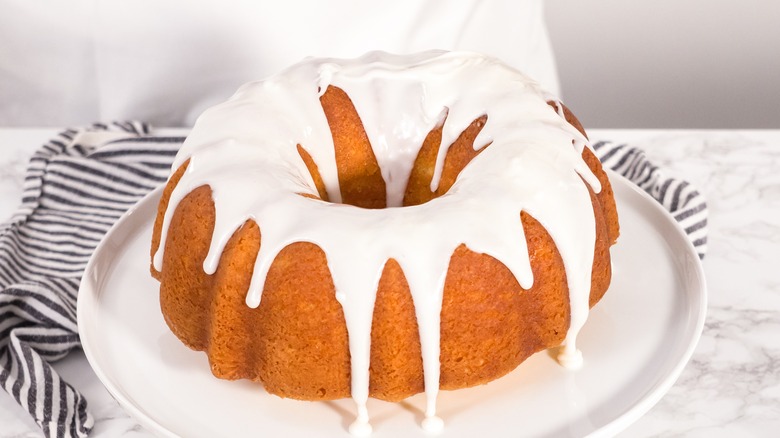The Simple Tapping Trick To Prevent Air Bubbles In Bundt Cake
We may receive a commission on purchases made from links.
Call it "granny chic" or "grandmillenial" style, but all things grandmas are back in a big way these days. Blame it on the big shift in living and working arrangements during the pandemic, because lately a lot of folks are making their aesthetic a little more old-timey. Trends like collecting antique china, refinishing brown wood furniture, and even embroidery and knitting are back in style. Cooking trends are right in line with granny-centric culture, including the return of the "it" cake of the 1960s: the Bundt.
According to Atlas Obscura, the original Bundt cake pans were an all-American creation dating back to the 1940s but fell out of style in the 1980s and '90s. They've come roaring back lately, especially after everyone started baking up a storm during COVID-19 shutdowns (per CNBC).
Bundt cakes are easy to make; all you need to do is mix up a pound cake-type of recipe and pour it into a greased pan and bake to get a fabulous molded confection. There are a few tips and tricks, of course, to Bundt perfection, including an easy hack recommended by Martha Stewart to get air bubbles out of the batter: Tap the pan against a flat surface a few times before you bake.
Tap and bake
The tapping trick works great for baking any cake or quickbread, but it's especially useful when you're making a Bundt. This is because you want to make sure all the surface area inside the pan is covered with batter so that you can easily release the cake when it's cool. It will also help you get a perfect-looking exterior. Think about all those cracks and corners in your pan — the cake has to settle in everywhere, and nothing's worse than going to all the trouble of baking a Bundt only for it to come out all crumbled. The tapping "drives air bubbles trapped in the pockets of the pan's design up to the surface, yielding a cake with crisp detail," Jennifer Dalquist, executive vice president of baking pan company Nordic Ware, explained to Martha Stewart. She also recommends tapping the pan against a surface like a cutting board.
If you're into the Bundt craze but have had problems getting your cake to release properly, there are a couple of other ways to troubleshoot. First, make sure you're letting your cake cool down enough before trying to invert and release it. You should let the cake cool down for at least 20 to 30 minutes before you try to get your cake out of the pan; and, since Bundt cakes are often denser and wetter than most cakes, it doesn't hurt to wait an extra 5 to 10 minutes just to be on the safe side.
Grease the pan properly
Nordic Ware is the cookware company that originally created Bundt cake pans; and, while the original mold is still the classic shape, these days there are hundreds of different styles and patterns of pans — even an octopus and a haunted house. If you want to see the newest and rarest designs, keep up with the Nordic Ware fanatics and collectors on social media, where groups show off their latest finds.
All those fine details in the specialty pans, however, have to be thoroughly greased so that you can pop your castle cake out without losing a turret. If the shape of your pan isn't too complicated, you can probably get away with a heavy coating of a baking spray like Pam for Baking, which is pre-mixed with flour. For the more ornate pans and heavier batters like Daredevil's Impossible Bundt Cake, however, you'll need to put in a little elbow grease and use some "cake goop" like cookbook author Jocelyn Delk Adams recommends, which is made with equal parts flour, vegetable oil, and shortening. Spread your goop liberally into all those little nooks and crannies before you pour the batter into the pan, using a pastry brush or swabbing it on with a paper towel. Once you have your batter in the pan, give it five or six good, firm taps against your cutting board or a countertop with a towel; and it's time to bake.


